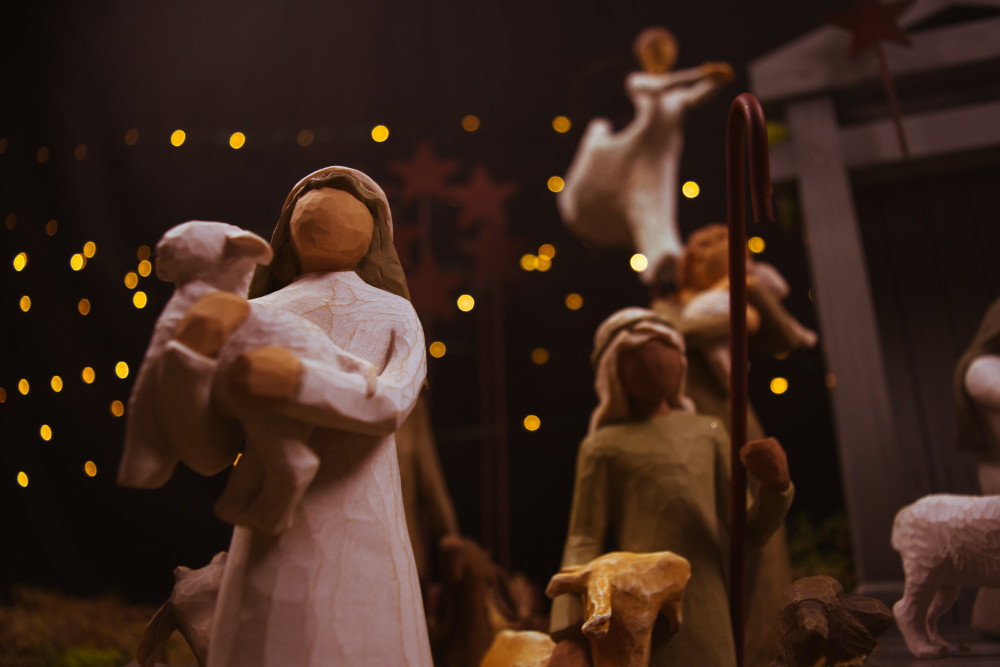
(Unsplash/Dan Kiefer)
The Anthropocene epoch — the geological period (and present time, according to some scientists) defined by enormous impacts humans have on the Earth — is forcing us to reconsider animals.
The Bible is full of references to them, beginning with the creation stories, where the human comes last and really can't show up until the realm of nature and animal and grains is fully in place. We need the water, animals and grains to survive.
The Bible continues its animal themes through the Psalmist's appreciation of the leviathan sea monster, and Jesus' Palm Sunday ride into Jerusalem on an ass. It includes non-stop references to sheep and the tasks abundant for their shepherds. They "keep watch over their flocks by nights." The shepherds become special recipients of the baby Jesus, the one who is also born in a manger.
These animal references don't stop at Christmas but also describe odd behavior between lions and lambs or children playing near the asp. Given the context of the predominantly carnivorous tendencies of our everyday lives and diets — hamburgers anyone? — why would Jesus think of humans as fishing for humans?
Listen to what he says here:
"Come after me, and I will make you fishers of men" (Mark 1: 17).
Taken literally, one might interpret the message as Jesus wants to catch people, perhaps for cannibalistic purposes. Taken symbolically, it of course means something much less ominous — that we are to catch each other with the excitement of the Messiah. We are to be contagious with our faith, to even go viral with it.
When I first got to my church, there was a committee called "Growth with Integrity." It made me think about what it means to fish for people. Certainly, we are not to eat them, nor eat them up with activity, once we "catch" them. What about a catch-and-release form of fishing? We are to release people stronger to the world, stronger in the love of Jesus who always gave everything away. He grew with integrity.
Or consider another complexity of biblical thought around animals, this time from Isaiah:
"Caravans of camels shall cover you, dromedaries of Midian and Ephah; All of Sheba shall come bearing gold and frankincense, and heralding the praises of the LORD" (Isaiah 60:6).
It takes more cultural competency than I have to appreciate being covered by a caravan of camels. Still, I get the point of the prophet's message: It means abundance as a gift. It means lots is on its way to you.
In small and large ways people experience abundance all the time. Its appearance usually surprises us.
I have a pair of socks that match a pair of tights that I really like. When I lost one of the socks, I was bereft. I knew it was some place and refused to toss the tights and the remaining sock. I allowed them to languish, alone, in my drawer. After two years of being lost in a suitcase, the orphan sock appeared.
If you have never lost a sock, do make fun of me. If you are a "loser" or somebody who loses stuff, have pity — or at least "em-pity" — on me.
More recently, I lost my new calendar and a folder of medical records, all of which I had placed in a small convenient bag. The calendar was so new I hadn't put my name in it.
Two weeks later, my losses showed up in the mail. The finders had called my doctor and used my prescription number to locate me. I called to thank them and apologized for the inconvenience my convenient bag had caused them.
Why tell stories about socks and bags? Because that which is lost can still be found. Because there are kind people in the world who will help you out and even bother themselves to do so.
Advertisement
Because the promise of the divine is that we will be surrounded by camels. For the people of Isaiah's time, camels signified abundance. For us, socks that match might do the same.
Better put, God is a gift-giver. Be prepared to find things you thought were gone or that you could never have. Be prepared to find the abundance of the almighty coming as lots of camels, enough for you and for all. That is the way the gift-giver thinks and behaves.
Fishers of men? Surrounded by Camels? Lions and lambs? Shepherds keeping watch over their flocks by night? Yes, that is the one we call Messiah, the one who began life in a manger.
Like creation started off with matters other than humans. It certainly gives us something to think about in this Anthropocene.
[Donna Schaper is senior minister of Judson Memorial Church in New York City.]








